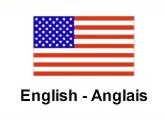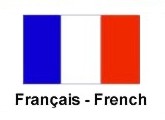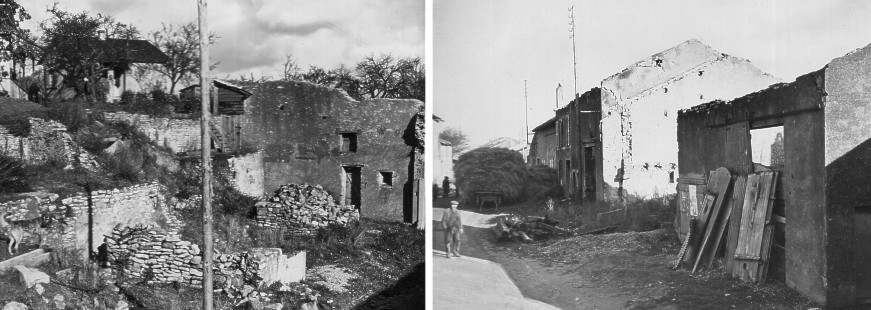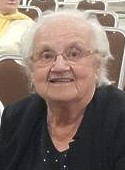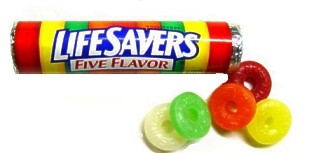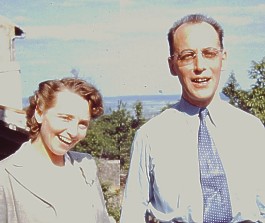Torlotting was not the only member of the Fèves committee to write to the people of Morganville. The April 7, 1949 Morganville Tribune contained the following item:
Mrs. Norman Canfield has the translation of the letter from the priest Louis Holveck of Feves, France. Mrs. Canfield was chairman of the committee that made and shipped layettes. He thanked her many times. Four babies have arrived since the layettes came. The last, as an example, was born to a family where there were three children, 17, 13, and 2 years of age, living in two rooms. This is about the size of a home many have. The town has 270 inhabitants. Mr. Holveck has a friend who lived in Kansas City and has told them about what Kansas is like. The lack of money has retarded rebuilding of [Fèves], but they are slowly repairing the damage as best they can.
So what was the damage like in Fèves? An American visitor would have first noticed the physical damage - damage created by errant shells and bombs intended for nearby military installations like Fort de Fèves. AAtF's assessment was that 75 percent of the village had been destroyed.
Left: Fèves building reduced to rubble; right: Rue Haute - Main Street - in Fèves looking east
The psychological damage created by the war would be much harder to assess. When Germany annexed Lorraine, some of its citizens
were allowed to stay. Others were required to join or pressured into joining the German war effort. Most of the Torlotting family
remained in Metz and had to endure the frequent nighttime bombing of Allied planes trying to destroy the rail yards in the heart of
the city.
In contrast, expulsion was the lot for those who were deemed unlikely to live in peace with the German occupiers or whose homes
were to be turned over to German settlers. Fèves resident Simone (Watiez) Joly was a youngster at the time, and in 2014 described
what she experienced.
One day in April 1941, a bus was waiting for us on the central square in Semécourt. We filled the bus. Our luggage couldn't be
more than 35kg. In Metz, we were put on a train towards the south of France. But on the way, the train stopped in Dijon, where
we were sent to a little village surrounded by mountains. We stayed there for 3 weeks. We were put in a holiday camp. There were
people from Semécourt, Fèves and Norroy-le-Veneur. Barely settled, we had to leave again towards the south of France, precisely
Lavaur. We would stay with the inhabitants. We started our new life with almost nothing, just the minimum. My father would find
a job in a bakery.
Joly
Lavaur and several other small villages approximately 10 miles east of Toulouse near the border with Spain served as their new
home. When Lorraine was liberated late in 1944, a few of those who had been expelled decided to remain in the south of France,
while most returned to Lorraine, thus separating families.
For those who chose to return, many would face the reality of severely damaged or demolished homes.
The photo on the left was taken in Lavaur after the expulsions. The man fourth from the left holding a pipe is Emile Pierson, who would become the deputy mayor of Fèves after the liberation. The man to his left with the watch chain is the future village mayor Auguste Berne. The photo at the right was taken when the people from Fèves and Plesnois, a village to the south of Fèves, returned to Lorraine after the liberation. The happiness shown here may have been dampened when they saw the condition of their villages.
There were additional problems not apparent in the smiling faces of seemingly-healthy children Todd had met at the school house or
adults stepping off the train from Lavaur. In his report about stopping in Fèves, Todd mentioned meeting "in the kitchen of the
mayor's damp, unheated house." It is not known if mayor Berne's home had previously been heated by wood or some sort of petroleum
product. If it was the latter, his family was out of luck as gas and oil were in very short supply and would have been hard to
obtain with any amount of money. There certainly was wood nearby, but how would it be transported to the village without gas or
draft animals?
While places nearby might have a variety of foods, without transportation and money, how would it be
obtained? As for neighbors, they were in the same predicament, so sharing would not help much.
Additional insights can be found in Billie Utley's April 22 letter to Roenigk. After confirming that the film he had sent
had arrived, she added comments on conditions in France as well as their travel plans.
We plan to go to Feves sometime after May 1st as our gas is rationed and we will wait until the new liters are
issued. We will write Henri (I have someone else write for us.) when we set the date so he will know we are coming. As
Ed has Saturday and Sunday off, it will work out fine for us. Possibly we could leave here Friday p.m. and get part
way there yet on Friday. Rheims is on the way to Feves ...
The roads here are good, but narrow - so many small cars are the reason, I guess. The countryside is very similar to
the states, although spring comes so early here - looks like the latter part of May back home. The spring wheat is
waving a wee bit; lilacs, tulips, etc. are in full bloom and all the cyclists (millions of them) are wearing shorts.
One sees many tandem bikes - seems one person never goes alone, always a group of 3 or more riding along together.
These French really enjoy their parks and all of nature as they are always out of doors, sitting on the grass, drawing,
reading, painting, knitting or just loving. We are enjoying it no end.
Velma's letter arrived this a.m., saying she was sending some Lifesaver candies and a few other things for us to
take up there. We had planned on taking some evaporated milk (It is rationed to us, but we don't always buy all our
ration of it.), perhaps some milk chocolate bars (Roundtrees, English made, but are almost as good as Hershey's) for
the children.
Life Savers candy
As our car is so small, and we probably won't be alone, we can't take too much, but know they will appreciate anything in the way of food. If possible, I will try to take a few other items if we have the room. White flour is not to be had in France. ... Butter and milk went off ration last week, but they are very scarce. Chocolate, sugar, macaroni, rice, spaghetti, oil for salads and cooking, and coffee are among the things still rationed.
Utley's comments - "I have someone else write for us" and "we probably won't be alone" - refer to their Paris friends
Yvonne and Leon Bazin. Yvonne was fluent in French and English and they would rely on her talents several times
over the coming months.
Yvonne and Leon "Jean" Bazin
